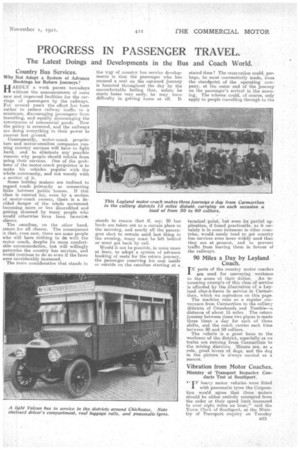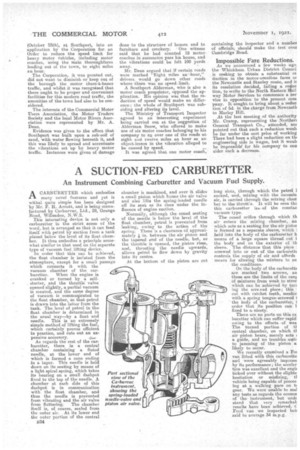PROGRESS IN PASSENGER TRAVEL.
Page 23

Page 24

If you've noticed an error in this article please click here to report it so we can fix it.
The Latest Doings and Developments in the Bus and Coach World.
Country Bus Services.
Why Not Adopt a System of Advance Bookings for Return Journeys?
HARDLY a week passes nowadays 1. without the announcement of some new and improved facilities for the carriage of passengers by the railways. For several years the effort has been rather to reduce railway traffic to a minimum, discouraging passengers from travelling, and equally discouraging the conveyance of unessential goods. Now the policy is reversed, and the railways are doing everything in their power to recover lust ground.
Consequently, motor-coach proprietors and motor-omnibus companies running country services will have to fight hard, and to eliminate any possible reasons why people should refrain from using their services. One of the pprob lemsi lems of the motor-coach proprietor s to
make his vehicles popular with the whole community, and not merely with a section. of it.
Some holiday makers are inclined to regard roads primarily as connecting links between public houses.. If this class is catered for, even by a section of motor-coach owners, there is a decided danger of the whole movement becoming more or less discredited and getting shunned by many people who would otherwise have been lucrativle clients.
The omnibus, on the other hand, caters for all classes. The consequence is that, even now, there are some people who will have fiothing to do with the motor coach, despite its more comfortlble -accommodation, but will willingly patronize the country bus services, and would continue to do so even if the fares were considerably increased.
The main consideration that stands in the way of country bus service developments is that the passenger who has secured a seat on the outward journey is haunted throughout the day by the uncomfortable feeling that, unless he starts home very early, he may have difficulty in getting home at all. It
stands to reason that if, say, 20 bus loads are taken out to a certain place in the morning, and nearly all the passengers elect to remain until last thing in the evening, many must be left behind or must get back by rail.
Would it not be possible, in some cases at least, to adopt a system of advance booking of seats for the return journey, the passenger reserving his seat inside or outside on the omnibus starting at a stated time ? The reservation could, perhaps, be most conveniently made, from the standpoint of the operating company, at the outer end of the journey on the passenger's arrival in the morning. The scheme could, of course, only apply to people travelling through to the
terminal point, but even its partial application, if found practicable, as it certainly is in some instances in other.coun. tries, would surely tend to get country bus services even more widely used than they are at present, and to prevent traffic from leaving them in favour of the railways.
90 Miles a Day by Leyland. Coach.
TN parts of the country motor coaches A are used for conveying workmen to the scene of their duties. An interesting example of this class of service is afforded by the illustration of a Leyland char4-bancs in service in Carmarthen, which we reproduce on this page. The machine runs as a regular conveyance from Carmarthen to the colliery districts of Crosshands and Tumble—a distance of about 15 miles. The return journey between these two places is made three times a (lay for each of three shifts, and the coach carries each time between 50 and 60 colliers.
The vehicle is a great boon to the workmen of the district, especially as no trains are running from. Carmarthen to the mining districts. Miners, are, as rule, great lovers of dogs, and the dog in the picture is always carried as a mascot.
Vibration from Motor Coaches.
Ministry of Transport Inspector Conducts Test at Southport.
" -FF. heavy motor vehicles were fitted
with pneumatic tyres the Corporation would agree that these motors should be either entirely exempted from the order or their speed limit increased to over eight miles an hour," said the Town Clerk of Southport, at the Ministry of Transport enquiry on Tuesday (October 25th), at, Southport, into an application by the Corporation for. an Order to reduce the speed limit for heavy motor vehicles, including motor coaches, using the main thoroughfares leading out of the town, to eight miles an hour.
The Corporation, it was pointed out, did not want to diminish or keep out of the borough the motor Chars-babancs traffic, and whilst it was recognized thatthere ought to be proper and convenient facilities for this modern road traffic, the amenities of the town had also to be considered.
The interests of the Commercial Motor Users Association, the Motor Traders Society and the local Motor Hirers Association were represented by Mr. A. Dean.
Evidence was given to the effectthat Southport was built upon a sub-soil of sand, with water flowing beneath it, andthis was likely to spread and accentuate the vibrations set up by heavy motor traffic. Instances were given of damage done to the structure of houses and to furniture and crockery. One witness said that he had counted 18 motor coaches in succession pass his house, and the vibrations could be felt 100 yards away. Mr. Dean argued that if certain roads were marked 'Eight miles an --hour," drivers would go down other roads where there was no speed.limit.
A Southport Alderman, who is also a motor coach proprietor, opposed the application. His opinion was that the reduction of speed would make no difference; the whole of Southport was subsiding and altering its level. The Ministry of Transport Inspector agreed to an interesting experiment being carried out at the suggestion of Alderman Snow, who offered to make use of six motor coaches belonging to his company to cro over one of the roads ateight arid twelve miles an hour as an object-lesson in the vibration alleged to be caused by speed. It was agreed that one motor coach, containing the inspector and a number of officials, should make the test over Cambridge Road.
Impossible Fare Reductions.
As we announced a few weeks ago; the Whickham. Urban District Counci is seeking to obtain a substantial re dilation in the motor-omnibus fares or the Newcastle and Stanley route, and ir its resolution decided, failing a rquc tion, to write to the North Eastern Hail way Motor Services to commence a service in opposition to the present corn pany. It sought to bring about a reduc tion of 5d. in the charge from Newcasth to Marley Hill.
At the last meeting of the authority Mr. Cramp, representing the Norther! General Transport Co., attended, am pointed out that such a reduction woul( be far under the cost price of working There had been a slight reduction on th, engineering side in wages, but it woul( be impossible' for his company to con sider such a decrease.
































